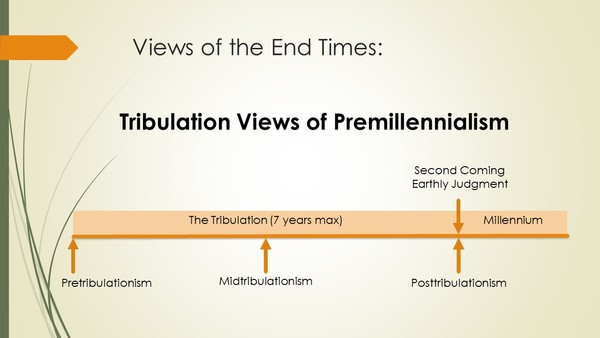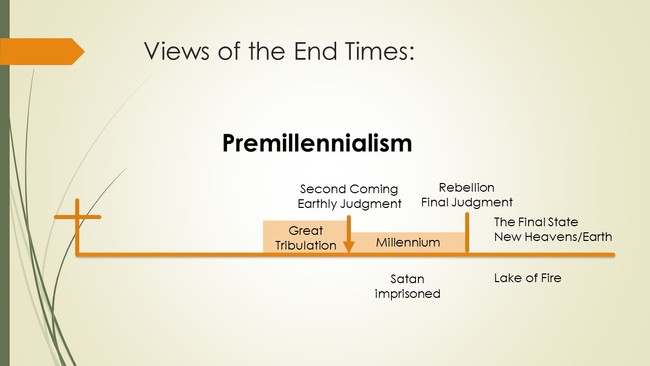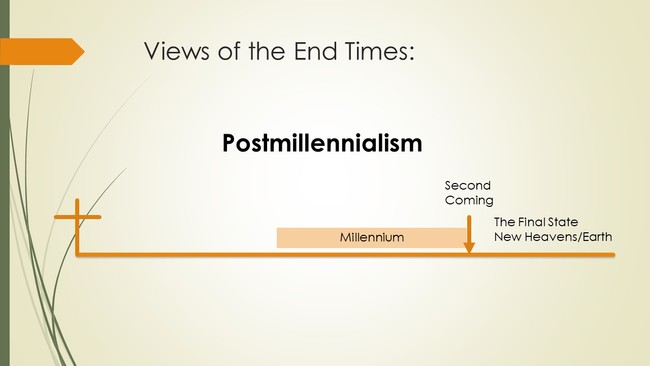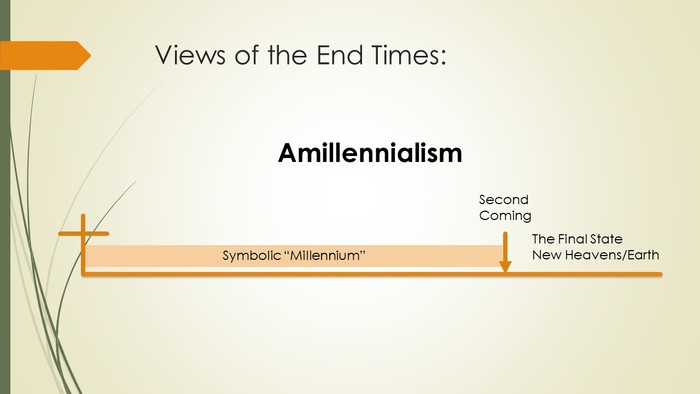Views of the End Times: Midtribulationism
 Pastor Marty
Pastor Marty  Tuesday, October 1, 2019 at 11:35AM
Tuesday, October 1, 2019 at 11:35AM Various Passages. This sermon was preached by Pastor Marty Bonner on September 29, 2019.
Over the last several weeks, we have looked at three views of the end times that generally employ an allegorical or symbolic approach to end times prophecy. They were Full Preterism (see blog post on Sept. 1, 2019), Amillennialism (see blog post on Sept. 8, 2019), and Postmillennialism (see blog post on Sept. 15, 2019). We then identified a fourth view called Premillennialism, which generally employs a literal approach to prophecy (see blog post on Sept. 22, 2019).
The differences in these previous 4 views all hinge on the relationship between the Second Coming of Jesus and the millennium. However, within the Premillennialist camp there are some differences that hinge upon the relationship of the rapture to the Second Coming of Christ. Parenthetically, if you are unsure about the meaning of the word “rapture” then you should see the previous blog post (Sept. 22, 2019). Thus, last week we looked at the first of these rapture theories within the Premillennialism, Posttribulationism. It was the view that the rapture is just one aspect of the resurrection, which only happens during the Second Coming of Jesus and after the Tribulation. Today we are going to look at a second view within Premillennialism called Midtribulationism. Here is a picture to get a rough approximation of the different views on the rapture within the Premillenialist group.

As you can see The Tribulation is a seven-year period of difficulty which involves the wrath of God upon the earth and ends with the Second Coming of Jesus. Today’s view believes that the rapture is an event separate from the Second Coming of Christ at the end of The Tribulation.
Is there a rapture of Christian’s before The Tribulation?
The Midtribulation Rapture view says, “No,” to this question. By the way, there is a minority view called the Pre-Wrath theory, which is similar to the Midtribulation view, but puts the rapture at the ¾ point of The Tribulation. However, it is not very common and is similar to the Midtribulation view. So, what does Midtribulation Rapture teach?
First, they believe that Christ raptures his Church in the middle of The Tribulation, which is clearly divided into two 3 ½ -year periods in Scripture. Second, they see the first half of The Tribulation as being the same as the seven seals and the seven trumpets of the book of Revelation (Rev. 6-11). The second half is connected to the seven bowl judgments. Third, they emphasize that the first half of the tribulation is the wrath of man, whereas the second half is the wrath of God.
Argument 1. Let’s take some time to walk through some of their arguments and give some kick back to them. They typically emphasize the many places in the Scripture where 3 ½ years are emphasized in relation to end times matters. Here are a couple of passages that give us such details.
Look at Revelation 11:3. Here, John is told of two witnesses that will prophesy for 1,260 days and then be killed in the city of Jerusalem (vs. 8). 1,260 days is basically 3 ½ years, and represents the first segment connected to The Tribulation. These witnesses are killed by the beast that ascends out of the bottomless pit (a prison for spirit beings). We are told that no one can touch the two witnesses until they finish their witness to the world, and then the beast will have the power to kill them. Now, let’s go to Revelation 13 to get some more information regarding this beast character.
In verses 4-5, we see that the beast is given authority to continue for 42 months. Interestingly, this just another way of referring to 3 ½ years. From Revelation 19, we know that the beast will be captured and thrown into the Lake of Fire at the Second Coming of Jesus. Thus, a rough timeline of The Tribulation would be: 3 ½ years for the ministry of the two witnesses, and 3 ½ years for the authority of the beast.
Let’s dig a little deeper on these references to 3 ½ years. Daniel 9:24-27 involves a prophecy wherein 70 groupings of seven years are determined for God’s prophetic dealings with Israel (totaling 490 years). These groupings of seven years are broken up into 3 groups: 49 years (7 sevens), 434 years (62 sevens, and the last is 7 years (1 seven). It is this last seven that we want to focus upon because of what it says about it in verse 27. We are told that the previous period of 62 sevens would end with the death of Messiah. “Messiah shall be cut off, but not for Himself; and the people of the prince who is to come shall destroy the city and the sanctuary.” So, after the death of Jesus there was only a period of seven years left for God to complete all prophecy with Israel. We are told in verse 27 that “the prince who is to come” will strengthen and confirm a covenant with Israel for 7 years. In the middle of the seven-year period, he will stop the sacrifices and bring in the abomination of desolation, which involves worship of a false god in the temple. Again, a clear reference is made to a turning point at the 3 ½ year point. This also synchronizes with Revelation 13 and the beast who has a mouth speaking blasphemies.
We are also told in Revelation 11:2 that Jerusalem will be trampled for 42 months (3 ½ years)-I would assume that this is in the second half under the beast’s authority. Likewise, Revelation 12 speaks of the Jewish remnant fleeing into the wilderness, being protected from Satan, and being nourished for 1,260 days (again 3 ½ years). It also describes this period as “a time (1), times (2), and half a time (½).” This too would equal 3 ½ years.
Clearly, the midpoint of The Tribulation is an important part of the end times. Yet, do these passages connect this midpoint to the rapture of the Church in any way? My short answer is that most of the passages make no connection to the rapture of the Church, and the few, where a case is made, are very stretched connections.
Argument 2. Typically, Revelation 11 and the two witnesses become a key argument. They are killed by the beast, left to rot on the streets of Jerusalem, and then resurrected and raptured by God after 3 ½ days (Rev. 11:5-12). These two witnesses are very reminiscent of Moses and Elijah because of what they do. They shut the heavens so that it doesn’t rain, they turn the waters into blood, and they cause plagues. Here is the question. Are they actually two individuals or are they a symbol of the Church? As you read through the passage, you can see where they could be a symbol in a few places. However, the details are so clear and specific that it becomes increasingly harder to make it fit with a symbol. What is symbol and what is not? How does one make that distinction? Are all these things symbols: the two witnesses, their death, the streets of Jerusalem, standing on their feet, their rapture, the voice, etc. It seems a stretch to take all of this symbolic and it seems a stretch to only take the two witnesses as a symbol. There is nothing textually connecting this resurrection of two individuals to the Church as a whole. Will all believers on the earth lay on the streets of Jerusalem dead for 3 ½ days? It seems not likely, especially since the passage gives no implication to this in any overt way. It seems that these two witnesses represent the grace of God to those who are about to be tempted to take the mark of the beast and pledge allegiance to him and his system. At this point in our history, modern man will demonstrate that it is one in spirit with the first century world, which crucified the Lord of glory.
This is the only passage that has a direct connection to a resurrection of any kind at the middle of The Tribulation, but yet falls short of a resurrection of all the Church.
Argument 3. The next argument uses 1 Thessalonians 5:9 to argue that “God did not appoint us to wrath, but to obtain salvation through our Lord Jesus Christ.” To them, this means that God will rapture his Church before he pours out his wrath. However, Midtribulationists view only the 2nd half of The Tribulation as the wrath of God. Is this a legitimate claim? Are only the bowl judgments in the 2nd half of The Tribulation connected to God’s wrath? The short answer is no.
If you look at Revelation 6:15-17, we have the sixth seal broken and the people of the earth are recognizing that the wrath of God has come, not “is coming.” By their own testimony they are looking at what is happening and saying, “Oh, No, the Bible was right!” We can also recognize that there may be some “wrath of man” in the seal judgments (note that the first seal releases a conqueror on the earth, the second releases war etc.). However, they are all being initiated by Jesus opening each seal. The implication is clear and obvious. He is removing the restraints to taking up his rightful authority over the earth. This document proves his right and is being opened in order to do so. These seal judgments and the Trumpet judgments later are all seen as the wrath of God.
Along with this, it is very common throughout the Old Testament to speak of events that are “the wrath of man,” and yet explain that they are primarily the wrath of God. A case in point is the destruction of Jerusalem and the exile of the people of Israel. No angels were involved in its destruction and their deportation. However, the prophets testified that the wrath of God had come upon Israel, even though Nebuchadnezzar was his instrument. Thus, it is a false distinction to emphasize the wrath of God against the wrath of God.
Argument 4. It is also common to take the trumpet of 1 Corinthians 15:52 and connect it to the seventh trumpet of the book of Revelation. Here is 1 Corinthians 15:51-52. “51 Behold, I tell you a mystery: We shall not all sleep, but we shall all be changed— 52 in a moment, in the twinkling of an eye, at the last trumpet. For the trumpet will sound, and the dead will be raised incorruptible, and we shall be changed.” (NKJV). Definitely, Paul connects the rapture/resurrection with the sounding of “the last trumpet.” We can also note that the seventh trumpet is the last of the trumpets in the book of Revelation and happens right after the killing of the two witnesses, aka midpoint of the tribulation.
So, is there anything in the description of the seventh trumpet in Revelation 11:17-18 that would lead us to believe that the rapture occurs here? I don’t believe so. The trumpet blast is followed by a declaration that the kingdoms of this world now belong to the Lord Jesus, and that he is going to rule forever. It is then that the 24 elders who surround the throne of God in the heavens make several statements. They do mention that the time has come that the dead should be judged, which by extension would involve resurrection. Also, the reward of the saints is mentioned, which also would involve resurrection. However, this passage has the sense of declaring that these things are on the horizon (have come). The world has been waiting so long and now the time has come for these things to be accomplished, not that they have already been accomplished. In fact, if all these things are done at this point, then the whole bowl judgments seem out of place. Christ doesn’t come down to reign for another 3 ½ years. How can he have already reigned, and judged the dead, and rewarded the saints? There is no clear statement that a resurrection of the saints happens at the 7th trumpet of Revelation.
Furthermore, It seems a stretch to think that Paul, who wrote 1 Corinthians 30 years earlier to John’s Revelation, had in mind the same thing John does. John is revealing a vision that he has had. Most of Revelation is stuff that has no New Testament connection. It is a fresh revelation from God that is clearly giving information that the apostles did not have before this. Yes, the Holy Spirit could have directed Paul to put down a phrase that he had no clue why he should include it, but this seems to run counter to what Paul is saying. He has a clear reference in mind when he mentions the last trumpet. On the other hand, the book of Revelation never calls the seventh trumpet, “the last trumpet.” Yes, it is logically the last of those seven, but nowhere is it called the last trumpet. Such, a connection is extremely tenuous, at best.
Let me reiterate that I appreciate that these views attempt to take Bible prophecy literally. I believe that it is the approach that God would have us use. Yet, people who hold one of the three Premillennial views of the rapture have not been very kind to each other historically. In truth, they are often quite nasty, employ ad hominin attacks, and demonstrate extreme arrogance. This is sad because our lord literally tells us not to do such things. Even if you believe that a fellow Christian is wrong in their interpretation, you are still required to love them. On top of this, no view of the rapture involves heresy that will endanger anyone’s salvation. This is simply an over the top line of reasoning. Our salvation is not based upon our view of the rapture.
May God help us to endeavor to be a people that will trust God regardless of what we are required to endure because there are people every day who are not in The Tribulation, and yet, they wonder if they can endure the things that they are facing right now. They need strong Christians who can come alongside of them and encourage them with the truth of God. Yes, God allows us to go through difficult things, but he also has a good plan for us. He is not allowing us to suffer needlessly. Instead, our lives are a witness to the world around us, and a witness against the fallen heavenly powers. “We choose Jesus! We choose to follow Him, and not the false pretenders who come to replace him!”
 Email Article |
Email Article |  Print Article | | tagged
Print Article | | tagged  Allegory,
Allegory,  End Times,
End Times,  Interpretation,
Interpretation,  Millennium,
Millennium,  Prophecy,
Prophecy,  Rapture,
Rapture,  Second Coming,
Second Coming,  Tribulation
Tribulation 


